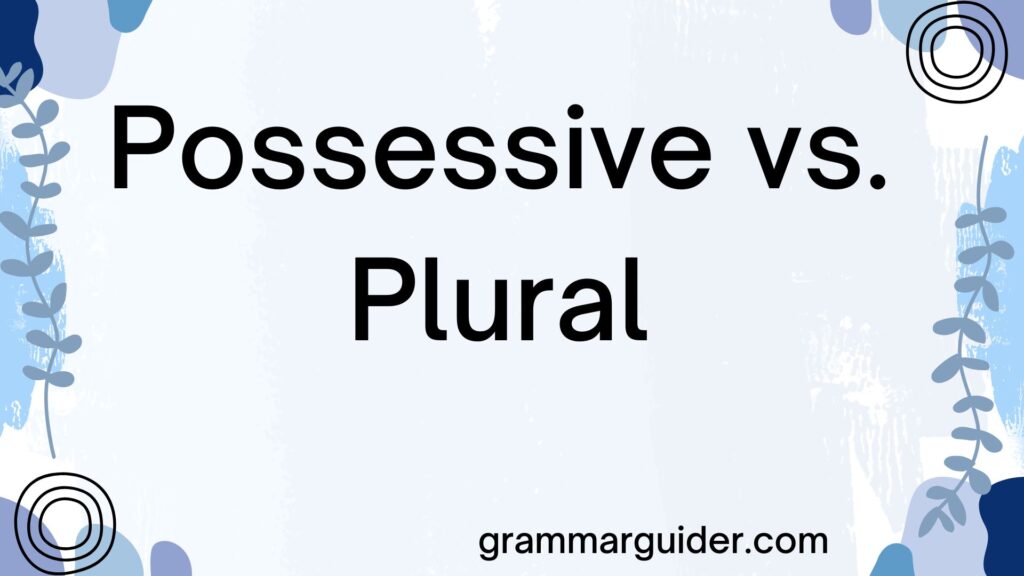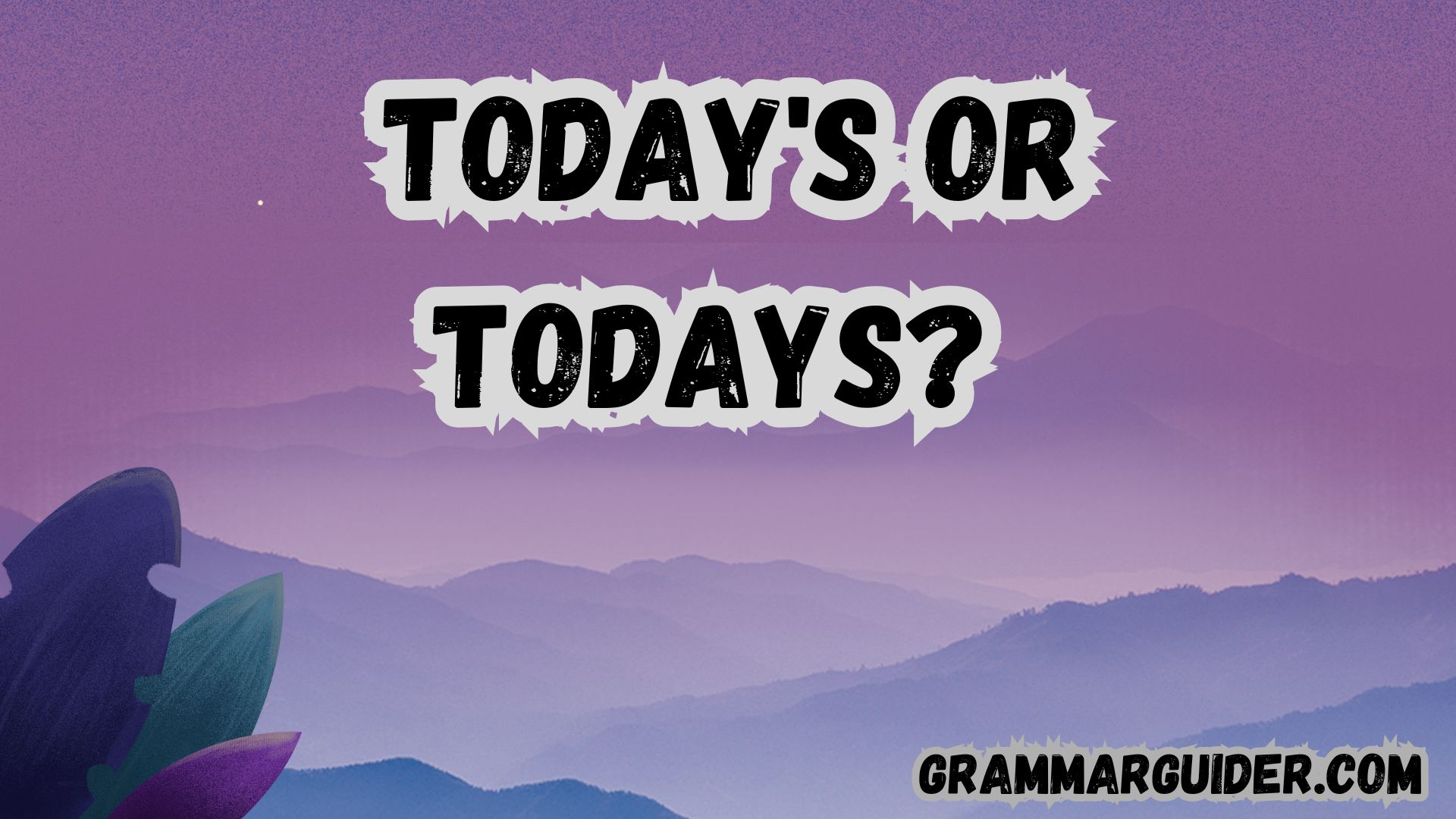English is a beautiful language with its quirks and complexities, but sometimes these little mysteries can cause confusion especially when it comes to apostrophe usage. One of the most common areas where people stumble is the difference between “today’s” and “todays.” Have you ever wondered, is it “todays” or “today’s?” Well, you’re not alone! Let’s dive into this topic and clarify everything you need to know to avoid common grammar errors.
In this article, we will explore the possessive form versus the plural form, clear up confusion around apostrophe misuse, and provide practical examples like email writing scenarios to help you understand the distinction.
We’ll also cover essential apostrophe rules to ensure your English writing remains spot on. So, whether you’re drafting a professional email or writing a blog post, you’ll know when to use the apostrophe and when it’s unnecessary.
The Basics: Apostrophes in English Grammar
Before we jump into today’s vs today’s, let’s brush up on some basic apostrophe rules that can help us navigate this mystery. Apostrophes are used primarily for two purposes:
- Possession: Showing ownership or belonging.
- Contraction: Indicating missing letters or sounds (for example, “it’s” for “it is”).
Now, what does this have to do with “today’s” and “todays”? Let’s break it down.
Singular Possessive Form: The Apostrophe in “Today’s”
When you use “today’s”, you are indicating possession. For instance, you’re referring to something that belongs to today. It’s a singular possessive form of the word “today,” meaning something that is associated with or belonging to today.
Example:
- “Today’s meeting” – This refers to a meeting that is taking place today. The apostrophe indicates that the meeting belongs to today.
Scenario in an Email:
You might send an email like this:
Subject: Reminder About Today’s Meeting
Dear Sam,
Just a quick reminder about today’s meeting at 3 PM. Please be prepared to discuss the latest project updates.
Looking forward to seeing you there!
Best regards,
Alice
In this case, today’s meeting is referring to a meeting that is scheduled for the present day, so the apostrophe is used correctly.
Plural Form: The Apostrophe-less “Todays”
Now, let’s talk about todays. Without an apostrophe, “todays” is simply the plural form of the word “today.” This form is very rarely used in everyday language because we usually don’t talk about multiple “todays.” However, it can appear in certain contexts.
Example:
- “The events of many todays” – Here, we are referring to multiple days (or “todays”). However, this is a somewhat formal or abstract expression that isn’t commonly seen in regular conversation.
Scenario in an Email:
It might look something like this:
Subject: Update on Todays and Tomorrow’s Deadlines
Hi John,
I wanted to remind you about the upcoming todays and tomorrow’s deadlines for the marketing project. Let me know if you need additional details.
Regards,
Sarah
In this case, “todays” refers to multiple “days” when deadlines are due. Though it’s technically correct, todays without the apostrophe is rarely used in everyday situations.
The Key Distinction: Possessive vs. Plural

So, what’s the main takeaway here?
- Today’s with an apostrophe is always possessive—it shows that something belongs to today.
- Todays without the apostrophe is the plural form of the word, though it’s rarely used.
Common Grammar Mistakes with Apostrophes
One of the most common grammar errors people make when writing is confusing the possessive form with the plural form. Let’s take a closer look at some examples:
- Incorrect: I will attend todays meeting.
- Correct: I will attend today’s meeting.
- Explanation: The meeting belongs to today, so you need the apostrophe.
- Incorrect: We discussed the goals of todays sessions.
- Correct: We discussed the goals of today’s sessions.
- Explanation: The sessions belong to today, so the apostrophe is needed.
- Incorrect: I’ll follow up on todays report later.
- Correct: I’ll follow up on today’s report later.
- Explanation: The report belongs to today.
Apostrophe Misuse Example:
If someone were to write:
- “The project goals for todays presentation were clear” instead of “today’s presentation”, they would be making a mistake. The apostrophe shows that the presentation belongs to today.
Possession in Grammar: Why Apostrophes Matter
The proper use of apostrophes in English grammar is essential because they help us clearly indicate possession. Without apostrophes, it’s easy for the meaning to become muddled.
Let’s consider these examples of possessive nouns:
- John’s book – The book that belongs to John.
- The company’s profits – The profits belonging to the company.
- Today’s weather – The weather that is occurring today.
The apostrophe in “today’s” signifies that the weather belongs to today, distinguishing it from any other day.
Correct Apostrophe Usage: More Examples
Here are some other common examples where apostrophes help convey possession:
- Today’s deadline: The deadline that falls on today.
- Today’s lunch: Lunch that is being eaten today.
- Today’s email: An email sent today.
Scenario in a Business Email:
Let’s consider a formal email regarding today’s deadline:
Subject: Reminder: Today’s Deadline for Submission
Dear Team,
Just a quick reminder that today’s deadline for the quarterly report submission is by 5 PM. Please ensure that all files are uploaded to the system by then.
Best regards,
Michael
Here, today’s deadline refers to the deadline that falls on the current day. The apostrophe is essential to indicate that the deadline belongs to today.
Apostrophe Rules: A Quick Recap
- Use ‘s for singular possession (e.g., today’s meeting).
- For plural possession, add only an apostrophe after the “s” (e.g., the boys’ toys).
- Don’t use an apostrophe for plural nouns (e.g., todays without the apostrophe isn’t a common use).
- Apostrophe misuse often leads to confusion. Be sure to ask yourself: is it showing possession or indicating multiple items?
How Apostrophe Usage Affects Business Writing
In business writing, clarity is key. Making sure your apostrophes are used correctly can help avoid English grammar mistakes and ensure your messages are professional and easily understood.
Here’s an example of incorrect apostrophe usage in a business email:
Incorrect Email:
Subject: Please Review Todays Report
Dear Mark,
Please review todays report and send your feedback by the end of the day.
Best,
Laura
Here, todays report should be today’s report because the report belongs to today. A simple apostrophe makes all the difference.
Apostrophe Mistakes: How to Avoid Them
To avoid apostrophe mistakes, always remember the possessive vs. plural distinction. If you’re showing ownership, add an apostrophe. If you’re just talking about more than one “today,” leave it without.
Quick Apostrophe Tips:
- Use today’s to show something belongs to today.
- Todays without an apostrophe is rare and usually not needed.
- Don’t confuse possessive with plural!
Table: Apostrophe Usage Examples
| Example | Correct Usage | Explanation |
|---|---|---|
| Today’s meeting | today’s meeting | Possessive: The meeting belongs to today. |
| Todays events | today’s events | Possessive: Events that happen today. |
| The employees’ feedback | employees’ feedback | Possessive: Feedback from multiple employees. |
| The cat’s toy | cat’s toy | Possessive: The toy belongs to the cat. |
Conclusion:
Understanding when to use today’s vs today’s comes down to one simple rule: If you’re showing possession, use an apostrophe. If you’re not, you don’t need one. By following this guideline and practicing apostrophe rules, you’ll avoid common mistakes and write clear English sentences in both business writing and everyday communication.
Remember, apostrophes are crucial in clarifying meaning and ensuring your writing remains professional and easy to read. So, whether you’re discussing today’s meeting, today’s deadline, or writing any other type of content, always check your apostrophes for accuracy!

Harley Rose is a seasoned expert in English grammar and writing tips, blending years of knowledge and a love for language into her work. With a sharp eye for detail and a talent for making grammar accessible, Harley shares practical insights that help readers write with precision and flair. Her content is ideal for anyone looking to strengthen their writing skills and express themselves with confidence.

